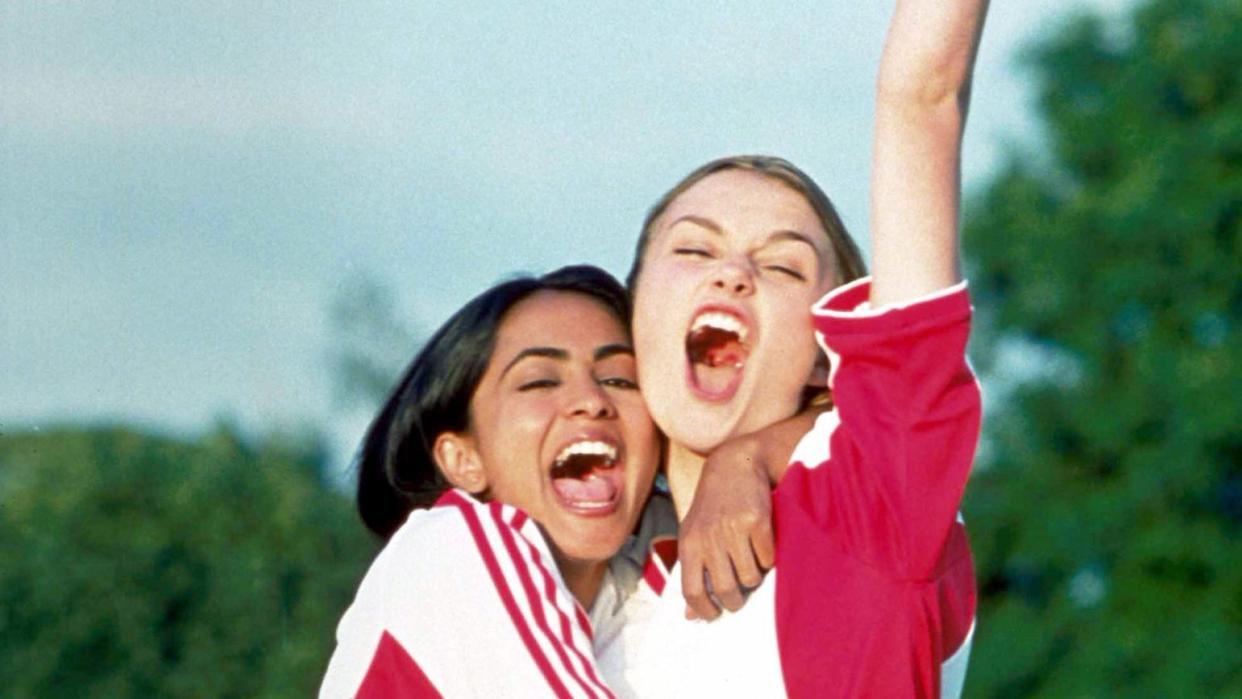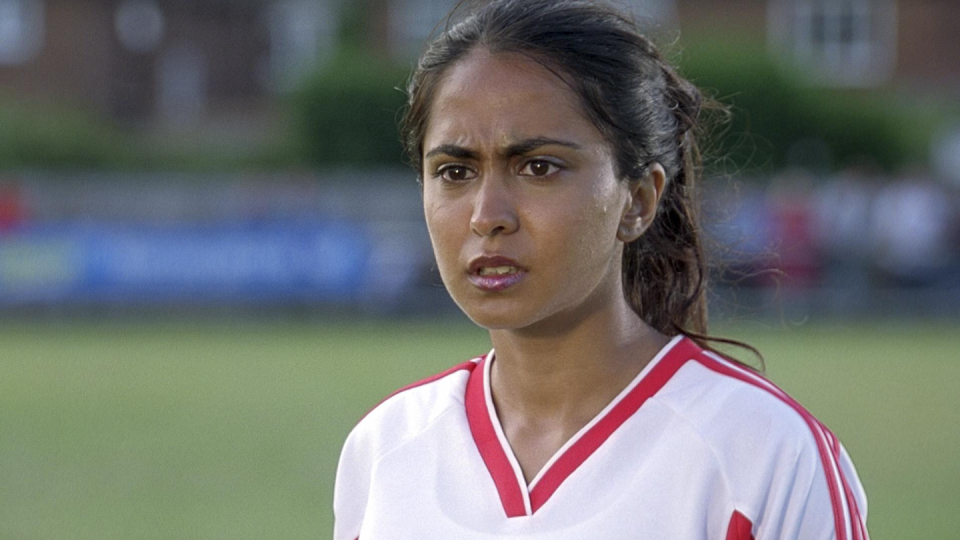'Bend It Like Beckham' Is Still Hollywood's Best South Asian Film

2003 was a bigger year than you remember. For politics, it was the beginning of the Iraq War. Pop culture? Paris and Nicole’s The Simple Life. In sports, Roger Federer won his first Grand Slam at Wimbledon, and 16-year-old Lionel Messi debuted with FC Barcelona. As for Hollywood, Gurinder Chadha’s Bend It Like Beckham premiered in North America.
First released in the UK the year earlier, Fox Studios brought Bend It Like Beckham stateside. It was just the right combination of genres for the era—teen girl protagonists and sporty romantic comedies reached an all-time level of popularity with audiences. Two decades later, early-aughts nostalgia is everywhere, with Love and Basketball, Jerry Maguire, and Bring It On still firmly in the zeitgeist. But seemingly buried under more popular, mainstream films, Beckham—which invited immigrant stories into Western comedies—is the overlooked underdog.
As the younger of two sisters raised in a Punjabi household myself, watching Beckham is like looking into the window of my family home. It’s a real, nuanced, hilarious, sweet depiction of a brown household that sits in a whiter society; there’s no generational trauma and no patronizing of the culture. What makes Beckham such a standout is that it doesn’t gloss over South Asian culture, nor does it depict it as something to escape or overcome. It's something to love, celebrate—and at many points in the film, laugh at and with. This means we get glitzy Y2K Desi fashion, boy-crazed teens comically hiding their relations from their pro-arranged marriage parents, petty older sisters and parents who just don’t understand is traditionally a world for, as the aunties of Beckham would say, gorehs. And that, sans unnecessary trauma and cultural criticism, is representation at its finest.
In case you're suffering from a soccer ball to the head related amnesia, here's a recap of the premise of Beckham. In the London suburb of Hounslow, Jess Bhamra (played by Parminder Nagra) is an aspiring soccer (football, in the movie—they’re English!) star, much to the dismay of her traditional, conservative Punjabi parents. But, as Jess puts so eloquently and iconically: “Who wants to cook aloo gobi when you can bend a ball like Beckham?”
Jess meets Jules (Kiera Knightley), an equally tomboyish soccer player who convinces her to join the local girl’s side, headed by Coach Joe (Jonathan Rhys Meyers). All the makings of a great comedy ensue: a love triangle (with the added flair of both Jules and Jess’s parents mistakenly thinking they’re lesbian lovers), adolescent rebellion, shenanigans, secrets, and soccer. Oh, and a big Indian wedding. Bend It Like Beckham was praised when it was released. 20 years later, what Gurinder Chadha did casually, quietly, and beautifully has yet to be replicated or followed by Western film studios—both in terms of South Asian narratives and teen rom-coms.
Bend It Like Beckham is not groundbreaking, radical, or particularly woke in any way. (At least intentionally—I invite you to watch the infamous scene where Jess is called a racist slur during a match by a girl from the opposing team. Frustrated and upset, she tells Coach Joe, “I wouldn’t expect you to understand what it feels like.” He responds, solemnly, “Jess, I’m Irish. Of course I understand what that feels like.”) Therein lies Beckham's utter brilliance. It’s a simple, mindless teen comedy that, through wit and whimsy, opens a window into a traditional Punjabi household. Without pomp or circumstance, Beckham invites a family of Indian immigrants into a genre that had been—and still remains—predominantly white. The South Asian angle aside, Beckham is a smart, sharp, bright comedy. Its brilliance is in its mundane approach to the genre—yes, this is a movie about an Indian girl—but more than that, it’s a coming-of-age comedy. The protagonist just so happens to be an Indian girl.

Most South Asian media in the West rests on the crux of protagonists wrestling with their culture before, ultimately, accepting it. Beckham is different—through strife and more familial arguments than I can count on one hand, Jess never disavows her culture or traditions. Being brown, in this movie, isn’t a burden that Jess needs to overcome to gain ultimate happiness or get the guy—her culture is a source of love and shelter, even when misguided. Even when touching on themes of race and racism, Beckham doesn’t stray from being a lighthearted comedy—it just becomes a more nuanced, complex portrait of a young woman whose immigrant parents don’t want her to face the same discrimination they did. It isn’t funny in spite of its links to South Asian immigrants, but because of it.
Hollywood’s lack of AAPI roles makes it difficult to compare Bend It Like Beckham to the modern expanse of South Asian movies in the West, because the expanse is rather minimal. According to a report from USC’s Annenberg Inclusion Initiative, only 5.9% of all characters in Hollywood from 2007 to 2019 were of AAPI heritage—and that’s encompassing all of the Asian and Pacific Islander nationalities. Granted, creators like Mindy Kaling and S.S. Rajamouli are bringing South Asian stories to Hollywood, but even with Netflix funding and an Oscar nomination, these stories lack the lighthearted truth and love that Beckham gives South Asian culture.
In a somewhat radical move for the early 2000s, Beckham is a movie that doesn’t moralize or make fun of Hinduism. Indians aren’t the butt of the joke here—not the “othered” group, the way they are even in contemporary Indian-centric Western comedies. Mindy Kaling’s Never Have I Ever is comparable in its focus on an Indian child of immigrants navigating her adolescence, especially when the things she wants often go against the wishes and traditions of her elders.
But where Never Have I Ever poses its protagonist, Devi, as the “weird Indian girl” who is somewhat ashamed of her culture and often at the butt of a racist joke from her peers, Jess and her family aren’t the butt of the joke in Beckham—they’re in on the joke. The movie is told through an Indian lens rather than a white one. Jess’s white friends and white soccer coach are the ones “othered,” with her parents commenting on Jules’s short hair, David Beckham’s bald head, and the strange customs of the English. It’s a celebration of South Asianness, and it isn’t revolutionary—it just is.
You Might Also Like


